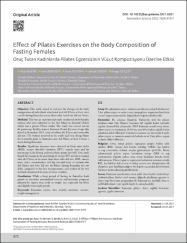Effect of Pilates Exercises on the Body Composition of Fasting Females
Citation
Batar, N., Kermen, S., Sevdin, S., Ersin, A., & Güçlü, D., (2022). Effect of Pilates Exercises on the Body Composition of Fasting Females. Bezmialem Science, no.4, 470-477.Abstract
Amaç: Bu çalışma, Ramazan ayında haftada en az iki kez oruç tutan ve pilates yapan bireyler ile oruç tutan ancak pilates yapmayan bireylerin vücut kompozisyonundaki değişiklikleri değerlendirmeyi amaçladı. Yöntemler: Bu, İstanbul Türkiye'de özel bir Pilates stüdyosu olan Noi Pilates'e kabul edilen 60 sağlıklı kadın üzerinde gerçekleştirilen deneysel bir çalışmaydı. Araştırma, 2019 Ramazan ayında oruç tutan, bazıları pilates yapan, bazıları yapmayan, 18-65 yaş arası 60 yetişkin, sağlıklı kadın üzerinde gerçekleştirildi. Araştırmaya katılan kadınların Ramazan'dan önce 6 ay boyunca pilates yaptıkları ve Ramazan boyunca haftada en az 3 kez pilates yaptıkları belirlendi. Bulgular: Oruç tutan ve pilates yapmayan grupta vücut kitle indeksi (BMI), triceps deri kıvrım kalınlığı (SFT), kas kütlesi ve yağ yüzdesinde anlamlı artışlar gözlendi (p<0.05). Çalışmamız pilates yapan kadınlarda triceps SFT ve yağ yüzdesindeki değişimin yapmayanlara göre daha fazla olduğunu buldu. Ramazan ayında pilates yapan ve yapmayan kadınların vücut kitle indeksi, kas kütlesi, bel çevresi ve kalça çevresi ilk ölçümlere göre farklılık göstermedi ve her iki yöntem de bu değişkenler açısından üstünlük sağlamadı. Sonuç: Ramazan ayında uzun süre oruç tutmak insanları hareketsizliğe sürüklerken, uzmanlar tarafından planlanan kişiye özel egzersiz ve beslenme programları özellikle obez ve hafif kilolu kişilerde kilo kaybına neden olabiliyor. Objective: This study aimed to evaluate the changes in the body composition of individuals who fasted and did Pilates at least twice a week during Ramadan versus those who fasted but did no Pilates. Methods: This was an experimental study conducted on 60 healthy women who were admitted to the Noi Pilates in Istanbul Turkey, which was a private Pilates studio. The study was carried out on 60 grown-up, healthy women between 18 and 65 years of age who fasted in Ramadan 2019, some of whom did Pilates and some who did not. The women involved in the study had been doing Pilates for 6 months prior to Ramadan and did Pilates at least 3 times a week during Ramadan. Results: Significant increases were observed in body mass index (BMI), triceps skin-fold thickness (SFT), muscle mass and fat percentage in the fasting and non-pilates group (p<0.05). Our study found the change in the percentage of triceps SFT and fat in women who did Pilates to be more than those who did not. BMI, muscle mass, waist circumference and hip circumference of women who did Pilates and who did not do Pilates during Ramadan did not differ compared to the first measurements, and neither of the two methods dominated in terms of these variables. Conclusion: While a long period of fasting in Ramadan leads people to inactivity, personalized exercise and nutrition programs planned by experts may result in weight loss, especially for obese and slightly overweight people.

















